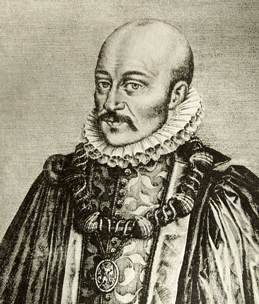Montaigne
John Florio's translation (1603) of Montaigne's Essais* made available in England the works of an original and stimulating mind. "Je suis moy-mesmes la matiere de mon livre": I am myself the subject of my book.
To turn inward to the mind in order to explore largely secular issues, rather than to meditate on the soul and the works of God, was a new way of thinking. And Montaigne's mind is fascinating. He combines an open and enquiring mind with a questioning skepticism, and an awareness of the complex and paradoxical nature of truth--a way of looking at the world that could be equally said to be characteristic of Shakespeare.
Shakespeare, Montaigne, and cannibals
Again like Shakespeare, Montaigne was politically conservative, while being intellectually challenging. His essay "On Cannibals" compares the societies of Europe with those of the newly discovered world, and suggests that European civilization is in some respects inferior--a startling conclusion in a Christian context.
Shakespeare read Montaigne, and uses this particular essay in The Tempest, notably at the point when the "good old Gonzalo" tries to cheer up King Alonso by describing the ideal commonwealth he would institute on the island (2.1.148-73). Caliban's name is suggestively similar to "cannibal," and he is in a real sense the subject of Prospero's colonization.
Electronic texts of the essays of Michel de Montaigne are available on line.
Footnotes
-
Essais
The term, its first use in literature, was probably intended to mean "tests," or "trials."
